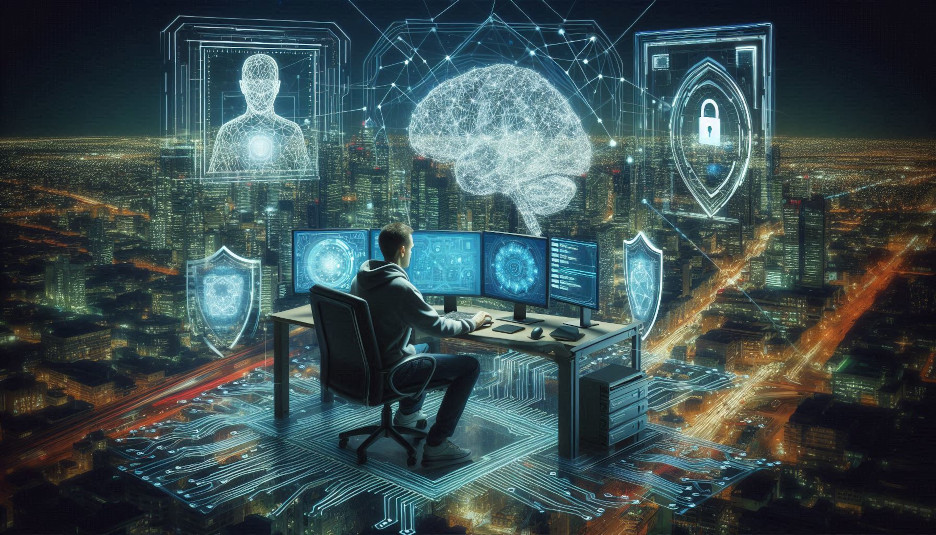Navigating the Cyber Frontier: A Deep Dive into Cybersecurity
-
 John Fry
John Fry - 03 Apr, 2024

Navigating the Cyber Frontier: A Deep Dive into Cybersecurity
The Dark Side of the Digital World
The digital age has brought unprecedented convenience and connectivity, but it has also ushered in a new era of cyber threats. From sophisticated ransomware attacks to data breaches that expose sensitive information, the threat landscape is constantly evolving. In recent years, we’ve witnessed high-profile cyberattacks that have crippled businesses, governments, and critical infrastructure. The WannaCry ransomware attack of 2017, for instance, affected over 200,000 computers in 150 countries. Such incidents underscore the urgent need for skilled cybersecurity professionals.
Hackers vs. Defenders: A Constant Battle
As cybercriminals become increasingly sophisticated, so too must the defenses employed to counter them. Cybersecurity professionals play a critical role in safeguarding digital assets and mitigating risks. Let’s explore some of the key roles within the cybersecurity domain:
Cybersecurity Analyst
A cybersecurity analyst is responsible for identifying, assessing, and mitigating cyber threats. Their duties may include:
- Threat Intelligence: Monitoring threat actors and emerging vulnerabilities.
- Vulnerability Assessment: Identifying weaknesses in systems and networks.
- Incident Response: Responding to security breaches and minimizing damage.
- Security Awareness Training: Educating employees about cybersecurity best practices.
Required Skills and Certifications:
- Technical Skills: Network security, operating systems, and database security.
- Certification: CompTIA Security+, CISSP, CISM
Ethical Hacker
Ethical hackers, also known as white-hat hackers, use their skills to identify vulnerabilities in systems and networks before malicious actors can exploit them. Their role involves:
- Penetration Testing: Simulating attacks to identify weaknesses.
- Vulnerability Scanning: Identifying and assessing vulnerabilities.
- Social Engineering Testing: Evaluating the effectiveness of social engineering attacks.
Required Skills and Certifications:
- Technical Skills: Programming, networking, and system administration.
- Certification: Certified Ethical Hacker (CEH), Offensive Security Certified Professional (OSCP)
Digital Forensics Investigator
Digital forensics investigators collect, preserve, and analyze digital evidence to assist in legal investigations. Their duties include:
- Data Acquisition: Collecting digital evidence from various sources (computers, mobile devices, cloud storage).
- Data Analysis: Examining digital evidence to identify patterns and anomalies.
- Report Writing: Documenting findings and presenting evidence in court.
Required Skills and Certifications:
- Technical Skills: Data analysis, computer forensics tools, and network analysis.
- Certification: Certified Computer Forensics Technician (CCFT), Certified Information Systems Security Professional (CISSP)
Cracking the Code: Essential Cybersecurity Skills
To succeed in a cybersecurity career, it’s essential to develop a strong foundation of technical and soft skills. Here are some key skills to focus on:
- Networking: Understanding network protocols, topology, and security.
- Operating Systems: Knowledge of Windows, Linux, and other operating systems.
- Programming: Proficiency in languages like Python, Java, and C#.
- Cryptography: Understanding encryption and decryption techniques.
- Incident Response: The ability to respond to security incidents effectively.
- Problem-Solving and Analytical Skills: Critical thinking and problem-solving abilities.
- Communication Skills: Effective communication with technical and non-technical audiences.
A Bright Future in Cybersecurity: Career Paths and Opportunities
The cybersecurity industry offers a wide range of career paths, from entry-level positions to executive leadership roles. As cyber threats continue to evolve, the demand for skilled cybersecurity professionals will only increase. By pursuing advanced certifications, gaining practical experience, and staying updated on the latest trends, you can position yourself for a successful career in this exciting field.
Level Up Your Cybersecurity Game: Continuous Learning and Professional Development
The cybersecurity landscape is constantly changing, so it’s crucial to stay up-to-date with the latest threats and technologies. Here are some tips for continuous learning:
- Online Courses and Certifications: Enroll in online courses on platforms like Coursera, Udemy, and Cybrary.
- Industry Conferences and Webinars: Attend conferences and webinars to network with other cybersecurity professionals and learn about emerging trends.
- Join Cybersecurity Communities: Participate in online forums and communities to share knowledge and get help.
- Practice Ethical Hacking: Experiment with ethical hacking techniques to gain hands-on experience.
By pursuing a career in cybersecurity, you can make a significant impact on the digital world and help protect individuals and organizations from cyber threats.


